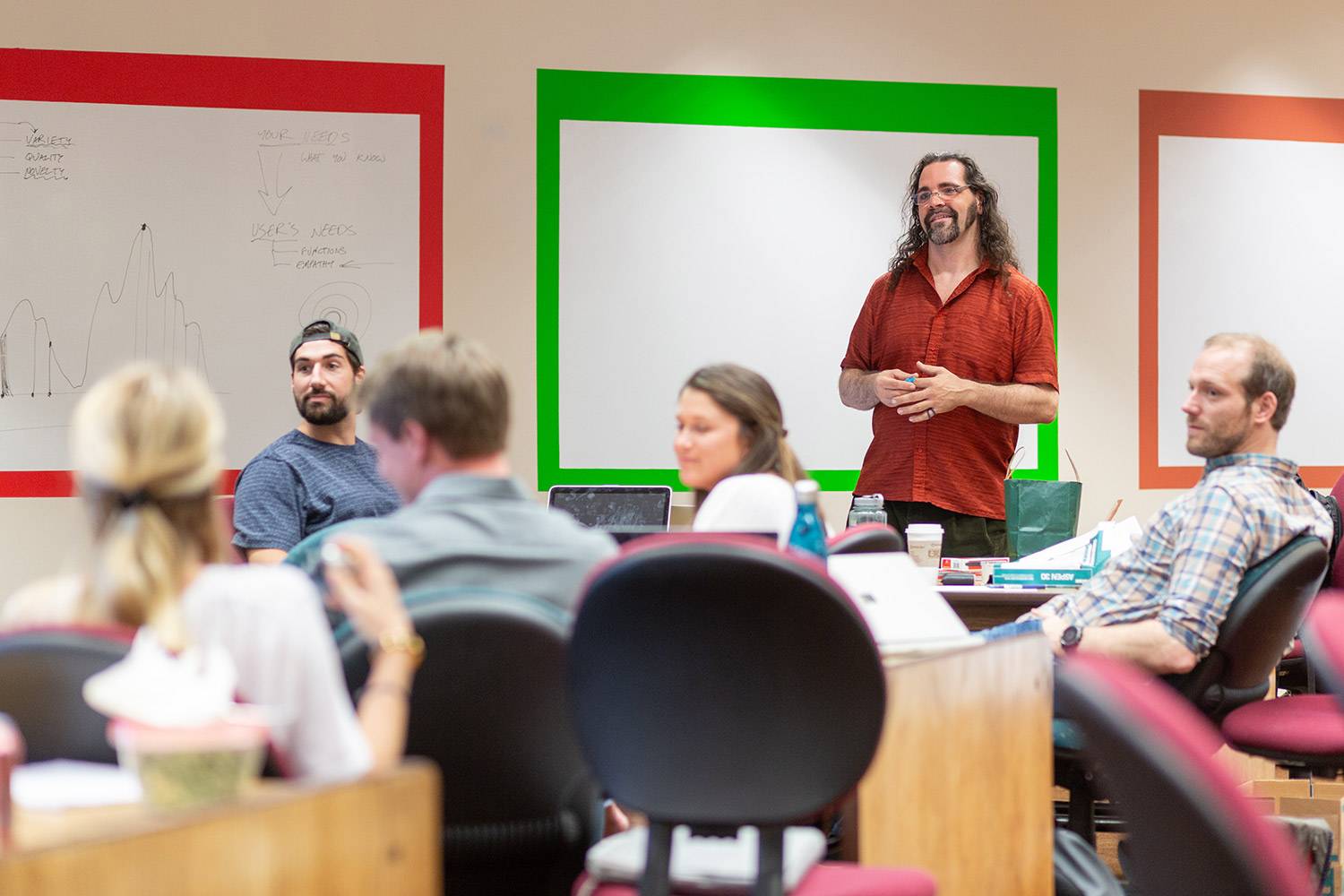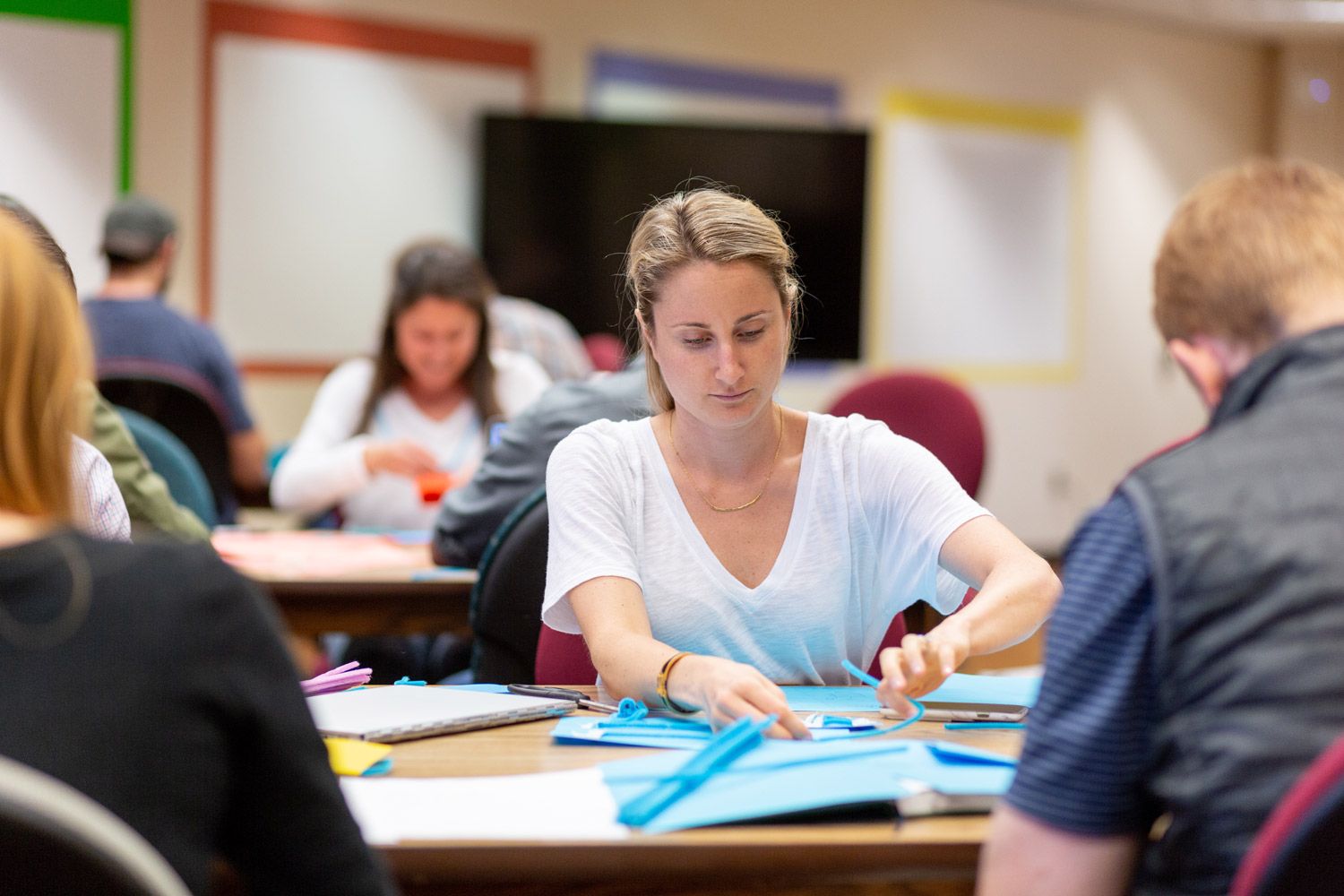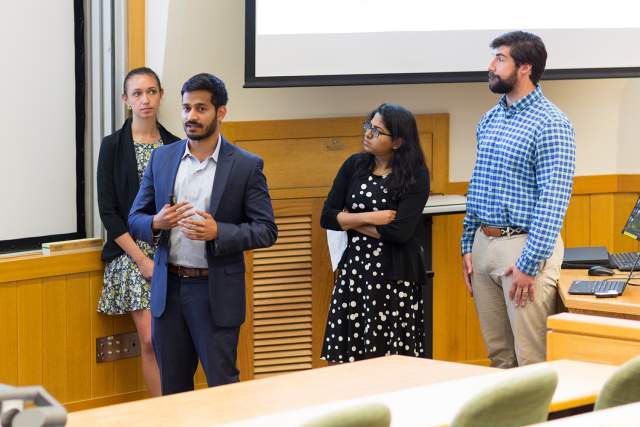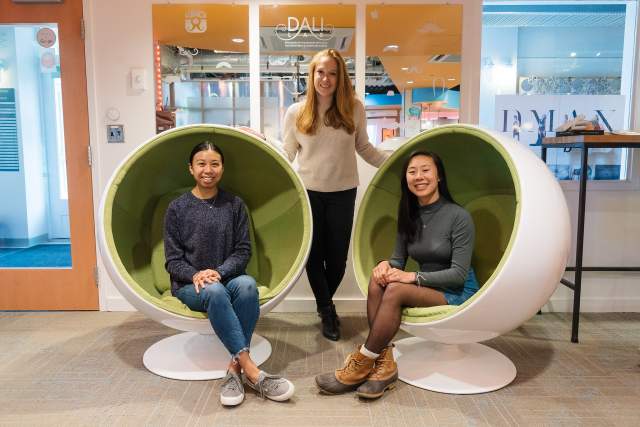Tuck Center for Entrepreneurship Launches Startup Incubator
The incubator offers structure and expert guidance to startup founders in the Tuck and Dartmouth communities.

A main goal of the incubator is to create a cohort of student startup founders.
On the second floor of Feldberg Library, an out-of-the-way corner has a new lease on life.
Colorful whiteboards adorn the walls. Broken-in leather chairs and other repurposed “entrepreneurially chic” furniture are scattered about. On Wednesday evenings between 5:00 and 8:00 p.m., a dozen or so Tuck students and other members of the greater Dartmouth community meet here, the newly created Startup Incubator space, to pursue their startup dreams. With the guidance of associate professor Steve Kahl D’91 and adjunct professor Daniella Reichstetter T’07, the students are working hard and supporting each other to see how far they can take their idea for a new business.
The Startup Incubator is a creation of the new Center for Entrepreneurship, a distinct pathway of learning and application for students at any stage of the entrepreneurship journey. “The center is really designed to meet entrepreneurs where they’re at,” says Kahl, the faculty director. “And we define entrepreneurs as both the idea generators and founders of new companies, and the builders—those who want to join founding teams to help develop the idea.”
As one might guess, the incubator is geared towards the founders. The weekly sessions spur the teams to think about moving from the idea stage to an actual business, with a focus on customer discovery, product development, and beginning the sales process. Like many other conventional incubators, the Startup Incubator at Tuck is run like a workshop, where teams learn from each other and from subject-matter experts who can help them solve technical and administrative problems. For example, Kahl and Reichstetter bring in a corporate lawyer to talk about incorporation, founders’ agreements, equity splits, and other important issues in corporate law. They also bring in an intellectual property lawyer, and alumni who specialize in marketing strategy and financial modeling.
One of the main points of the incubator is to create a cohort, so the students work together, provide feedback, and be supportive of each other.
The camaraderie of the incubator is another key component. “One of the main points of the incubator is to create a cohort, so the students work together, provide feedback, and be supportive of each other,” Kahl says. “Each week, we go through highs and lows of the week, which is important, because this is an emotional journey. You’re figuring out how to wrestle through successes and failures, so they don’t paralyze you.”
The rules of the incubator are intentionally straightforward and welcoming. It’s open to teams composed of at least one Tuck second-year student—the rest of the members can be from the Dartmouth community, but they don’t have to be. Interested teams have to meet a relatively low bar: they need to have completed some customer discovery (to get a sense of the problem to be solved) and put some thought into their potential market. These guidelines are to ensure the teams are committed to the business, and that the idea is mature enough so they can begin the execution phase as soon as the term starts.

Like many other conventional incubators, the Startup Incubator at Tuck is run like a workshop, where teams learn from each other and from subject-matter experts who can help them solve technical and administrative problems.
The first cohort of the Startup Incubator contains four teams: Fish MD, an artificial-intelligence-powered mobile app that diagnoses disease in the aquaculture industry; Gut Check, a mobile app that enables people with digestive issues to live a symptom-free life by identifying personal triggers of their discomfort; Natural Men’s Deodorant, a personal care line for men; and Nudg, which uses behavioral science to encourage more consistent two-way communication with the people who matter most.
Having the dedicated time every week to think about all the moving pieces is critical. And the fact that I can do it while taking classes that are important to me has been central to moving this forward. The incubator has been even better than I expected.
Angel Orzell T’19 is the founder of Nudg, a personal relationship management (PRM) application that grew out of the demands of her job prior to Tuck. As a transaction services manager at the consulting firm Plante Moran, Orzell was expected to grow and maintain a large personal network. She would meet with colleagues and business associates and had to remember to follow up with them in six months, but she often forgot. “I set up an Excel spreadsheet to remind myself, but I figured there had to be an easier way, rather than doing all this manually.”
Orzell worked on Nudg during her First-Year Project, last spring, and when she heard about the opportunity to join the incubator she applied right away. Backed by teammates from Tuck, and Dartmouth undergraduates at the DALI computer science lab and the Magnuson Center for Entrepreneurship, Orzell is relying on the incubator to provide structure and motivation to spend time on her business amid the many demands of the MBA curriculum. “Having the dedicated time every week to think about all the moving pieces is critical,” Orzell says. “And the fact that I can do it while taking classes that are important to me has been central to moving this forward. The incubator has been even better than I expected.”
Each incubator cohort stays together for one term; after that, teams can choose to apply for another session. At the end of each term, the Center for Entrepreneurship will organize an Entrepreneurship Day, where teams from the incubator (and others involved in entrepreneurship programs at Tuck) will set up booths demonstrating their products or services, and present short pitches about their business. The first Entrepreneurship Day this academic year will take place on November 7.

